The blackwater tank in your RV or camper is something you might not like to think about too often. However, it’s key to having a nice, comfortable RV experience. Plus, if your RV toilet gets clogged, you won’t have much choice in the matter.
After all, the toilet is an essential part of your motorhome. Since the blackwater holding tank is a critical part of that system, obstructions need to be addressed immediately.
In this article, I’ve covered several different methods you can try to clear a clogged RV blackwater tank.
This guide will also help you learn everything you need to know about maintaining your blackwater holding tank and preventing future clogs.
All right, let’s get started.
Table of Contents
- Understanding Your Blackwater Tank
- Why Is My Blackwater Tank Clogged?
- Get Ready To Clean
- Preventing Future Clogs
- Good Habits To Practice For Your Blackwater Tank
- Conclusion
Understanding Your Blackwater Tank
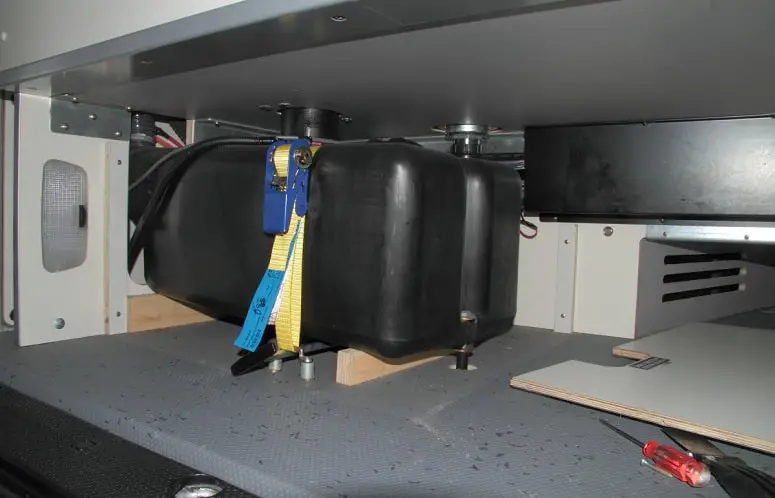
Knowing how your blackwater tank works is useful for several reasons.
Firstly, you will have a better understanding of what can cause problems.
Next, you’ll know why good tank maintenance habits are important and how to practice them.
Finally, it will help you understand how plumbing in travel trailers works.
Your recreational vehicle’s toilet system is not the same as that of a regular toilet.
Human waste doesn’t just disappear into sewer pipes underground — it ends up in your black tank.
Unlike your freshwater and grey water tanks, the black tank holds waste water and solids.
These consist of toilet paper, human waste, and whatever else you decide to flush down the toilet.
A properly maintained blackwater holding tank should be capable of breaking down solid waste over time. Water mixed with a chemical or natural solution inside the tank will do the job just fine.
All of the unwanted waste reaches the blackwater holding tank via a pipe connected to your toilet. As you may have guessed, this sewer line shouldn’t be neglected either.
Are you curious to see what a blackwater holding tank looks like inside?
Here’s a short video showing the inside of a brand new black tank while being flushed:
Why Is My Blackwater Tank Clogged?
You might be wondering what the most common causes of black tank clogs are.
There are several conceivable scenarios that can lead to RV toilet/black tank clogging. These are:
Waste Buildup
The most common cause of black tank obstructions is the accumulation of waste. Too many solids can build up and, after a certain period of time, form an obstruction. Just to be clear, I’m talking about bathroom tissue and, of course, poop.
This can occur if you haven’t been dumping the tank regularly.
Not cleaning the tank on a regular basis can also lead to waste accumulation in both the line and the tank.
If your blackwater holding tank is equipped with sensors, you may be wondering how waste could build up without you knowing. Well, the truth is that tank sensors can fail over time, especially if they are neglected.
Dirty sensors can give you inaccurate readouts. You may think your tank is only half-full when it’s actually full to the brim.
Flushing The Wrong Items
There are certain items that should never be flushed, such as wet wipes and sanitary products.
These things can encourage the formation of obstructions, especially if you’re flushing them often.
Dumping Too Often
It sounds counterintuitive, but dumping your tank too often can cause obstructions.
Frequent dumping will dry your RV tank out, which should definitely be avoided. Waste and other solids can stick to the tank’s dry walls and eventually build into blockages.
Get Ready To Clean
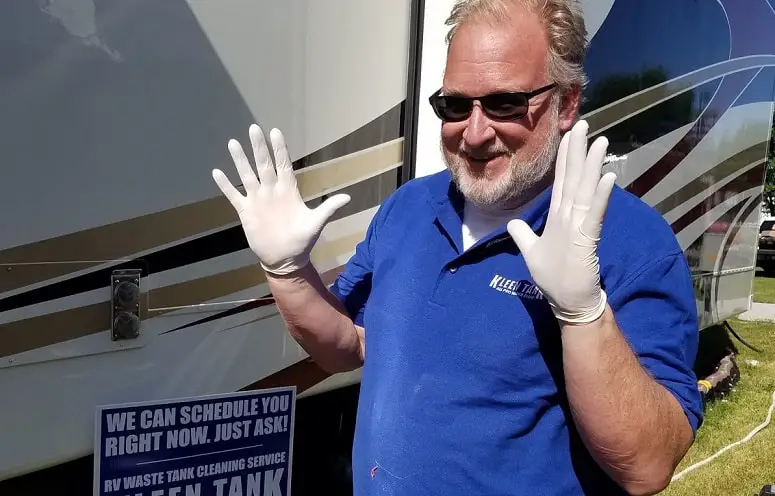
Before you get busy trying to fix the obstruction, don’t forget to protect yourself.
Just because you aren’t dealing with gas lines or electrical wiring doesn’t mean you aren’t exposed to any risks.
1. Take Safety Precautions
I shouldn’t need to tell you that you should avoid exposing yourself to waste at all costs.
Not only is the contact with human feces disgusting, but it’s also dangerous — it can make you physically sick.
You might also be handling serious chemicals to get rid of the clog. If that’s the case, make sure you have a good pair of gloves on before you start working on fixing the problem.
Since you’re going to be up close and personal with your black tank, think about covering your eyes as well. You can invest in a pair of safety goggles.
I strongly suggest choosing adjustable protective eyewear (like the SuperMore Anti-Fog Safety Goggles listed on Amazon) so it can fit different head shapes and sizes.
It’s always great to have a friend or family member assisting you.
Some of the methods are easier to carry out with an extra pair of hands. When handling a job like this, moral support doesn’t hurt either.
If you’re the type of RV owner who gets queasy just dumping the tank, it’s best to not force yourself to fix the obstruction.
Not everyone is going to be comfortable delving into the inner workings of an RV sewage system.
Hiring an expert to remove the blockage on your behalf is always an option. Note that seeking professional help will always cost you more than taking the DIY route.
2. Clean The Waste Pipe
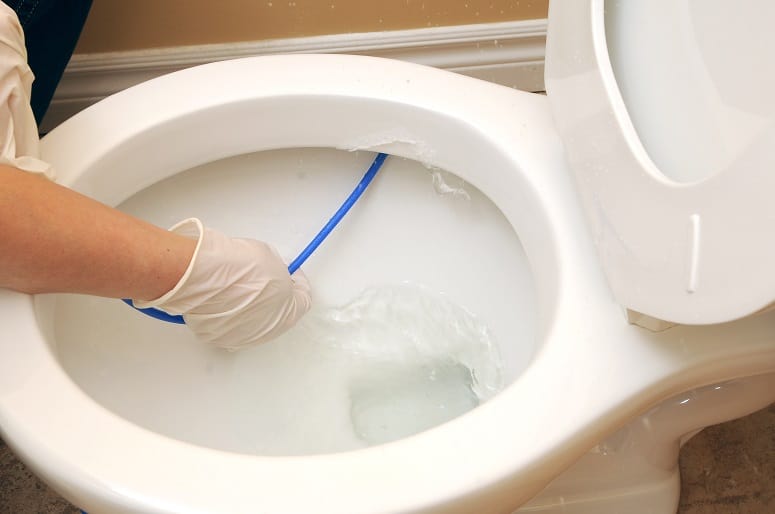
The obstruction might not be located in your black tank; your waste pipe could be the source of the problem.
If you dumped your black tank out but there is still a clog, your waste pipe is likely at fault. If you can’t remember the last time you cleaned it, you may be dealing with what is known as pyramid plugs.
Pyramid plugs are an interesting name for a repulsive phenomenon. These are the result of waste accumulation that eventually hardens. The more waste collects, the more pyramid plugs you will have to remove.
To remove pyramid plugs, you’ll have to get hands-on. If the toilet bowl is clogged, you should definitely put on your gloves and protective goggles.
You’ll need to grab a toilet snake and prepare to put some effort into the endeavor. Get an auger that’s extra long and flexible.
You’ll probably be able to feel the pyramid plugs as you poke around. Take your time until you’re certain the line is all clear, even after the main obstruction dissolves.
Another option is to use a toilet wand with a motor. As I’ll mention below, make sure to use one that’s safe for RV or camper toilets.
3. Check For Other Potential Issues
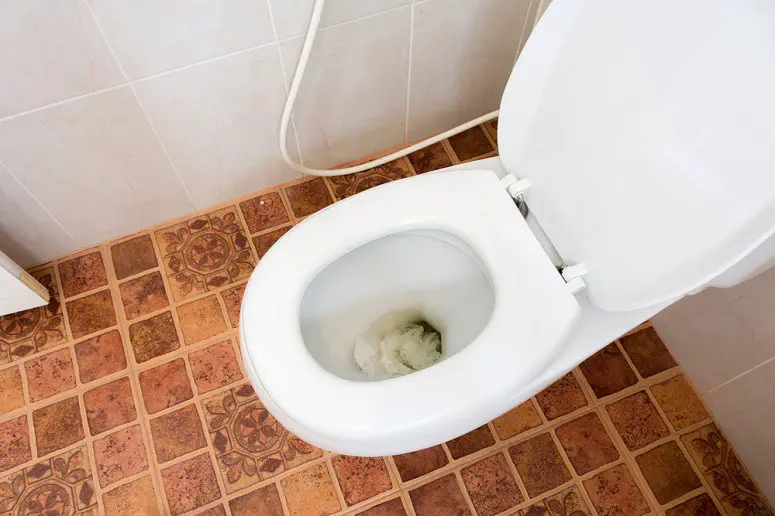
The next step is eliminating the possibility of other issues, both minor and major.
You don’t want to waste your time and effort trying to fix a clog that doesn’t exist.
Common signs of an obstruction include a bad smell from the toilet and difficult tank dumping.
However, there are several other problems that may be at the root of these symptoms. These include:
Leaky Toilet
Your toilet might be leaking — check for water on the floor of your RV or 5th-wheel bathroom.
Your toilet might be improperly secured to the floor of the bathroom. If this is the case, worry not, because it’s a fairly easy problem to fix.
Dirty Toilet
Waste collecting in your toilet can be responsible for some pretty powerful odors. Give your toilet a thorough scrub-down and see if it helps.
Broken Or Stuck Toilet Flapper
A broken toilet flapper or ball valve could be behind the stink. This mechanism is responsible for forming a seal between the black tank and the toilet itself.
If this seal is not airtight, smells will escape. Check to see if waste or toilet paper is caught in the flapper, keeping it open.
If it’s broken, you’ll have to replace it with a new one.
Learn how to switch out the seal with the help of this video:
Improperly Set-Up Tank Valves
Testing your black tank valves can save you a lot of time. Perhaps you forgot to open a valve or connect the sewer line properly. This is the best-case scenario — nothing more needs to be done.
4. Don’t Make The Problem Worse
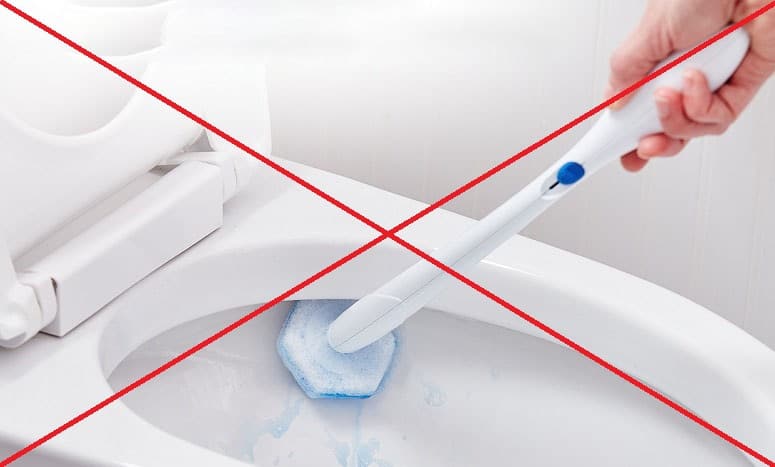
Let’s get on the same page about the things you should avoid when unclogging your RV tank. Approaching an obstruction the wrong way can be disastrous.
You don’t want to cause irreparable damage to your tank.
Additionally, trying these strategies out can have terrible consequences, like waste going where it shouldn’t.
Motorized Toilet Wands For Regular Toilets Are Unsuitable
A toilet wand (or snake) is going to come in handy when you’re unclogging your tank. A motorized one can save you some elbow grease, so why not use one? Well, there’s a perfectly good reason.
Using a motorized wand intended for residential toilets isn’t advisable because you can accidentally end up puncturing your tank. Always use models designed specifically for RV toilets.
Don’t Use A Pressure Washer
Pressure washers might sound like an easy solution to your clogging problem.
Water blasting at high pressure will definitely get rid of even the most stubborn waste accumulation, right?
Well, yes — it might break down the clog. However, it can also accidentally cause waste to splash around everywhere.
If this isn’t enough to convince you not to use one, consider the risks to you and your tank. A pressure washer might break your tank and potentially hurt you.
Pressurized Air Is A No-No
Using pressurized air poses the same problems as pressure washers. Your tank can crack or break apart due to the pressure.
Even if that doesn’t happen, you won’t be targeting the obstruction directly. Other waste will probably blow inside the tank and possibly out of it, towards you.
5. Try Cleaning Your Blackwater Tank
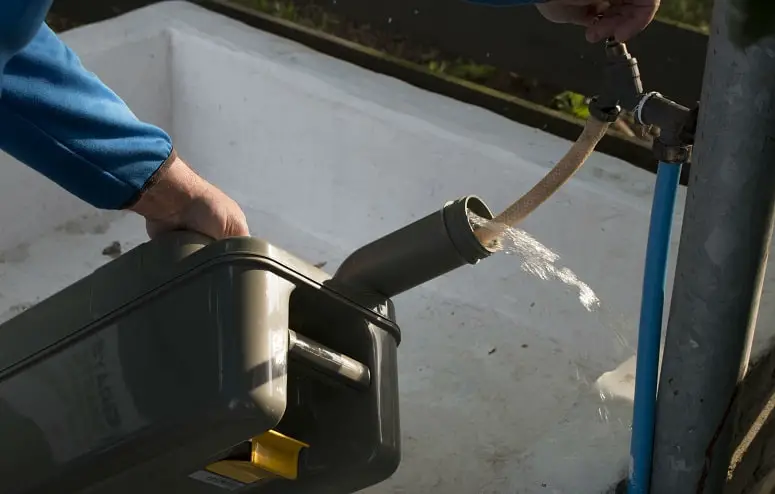
Try giving your tank a good clean before you get to more tedious tactics.
If the obstruction is not too serious, cleaning your tank might do the trick. If not, you’ll at least try the most obvious step.
You probably already have a product you use to clean out and maintain your RV black tank. If you don’t, this could very well be the reason you are dealing with a clog.
Special powders and liquids are used for the general maintenance of black tanks. Simply pour them directly into your toilet, let them slosh around a bit, and wait for them to break down the solids.
It’s necessary to use these products on a regular basis. There’s no such thing as a self-cleaning black tank.
You might prefer using products with natural ingredients. These are less harsh on your tank and won’t leave behind the stench of chemicals in your bathroom after you use them.
Try using a rinser for RV wastewater tanks. This lets you flush out your black tank without risking backflow or damage.
6. Unclog Your Blackwater Tank Using Products
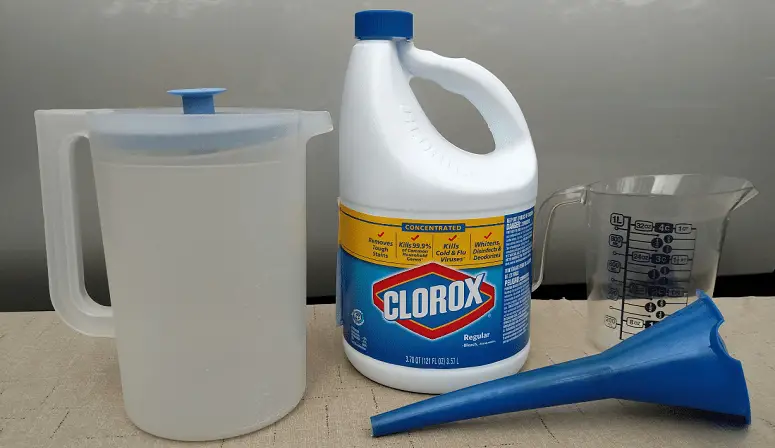
If cleaning your tank and line didn’t work, it’s time for the big guns.
There’s a range of products made to break down even the worst of obstructions.
You should know that these are different from black tank maintenance products. They tend to be stronger and are specifically made for eliminating obstructions.
Natural Products
All-natural solutions are not just for maintaining your tank. You can find products that make use of large quantities of enzymes or probiotics to break down clogs.
These work by literally digesting the buildup that forms the obstruction. Depending on the brand, they can target organic waste and/or artificial waste.
Chemical Products
If you want to get the job done with a chemical-based product, choose one that’s suitable for RV tanks.
7. Unclog Your Blackwater Tank Without Products
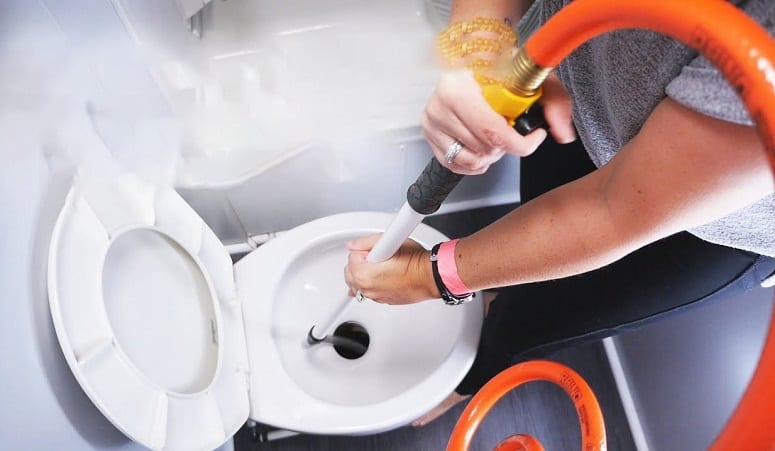
There are a few ways of cleaning out your black tank without the use of specialized products.
You might want to give these a try if you can’t wait for the product you ordered to arrive.
One of the methods you may have heard about is using ice. Supposedly, filling your tank with ice and driving around will dislodge clogs. But this might not be the best answer.
There are a lot of variables that come into play with this approach. The size of your tank, how much ice you use, how bad the obstruction is, etc.
The Geo Method
The GEO method is a tried-and-true technique for unclogging black tanks.
All you’ll need is a bottle of Calgon water softener and a transparent sewer hose adapter. You’ll need the adapter to see if the water is coming out clear or not.
Begin by hooking your black tank up to a sewer pipe. Dump the water softener down your toilet into the black tank.
You can be generous with the amount: the water softener won’t harm your tank walls.
This is where having a partner will come in handy. One of you should flush the toilet repeatedly, while the other monitors the sewer hose adapter.
This might not dissolve larger clogs completely, but it will clean your tank out. Watch this video to learn more about the GEO method:
8. Clearing A Clogged Blackwater Tank On The Road
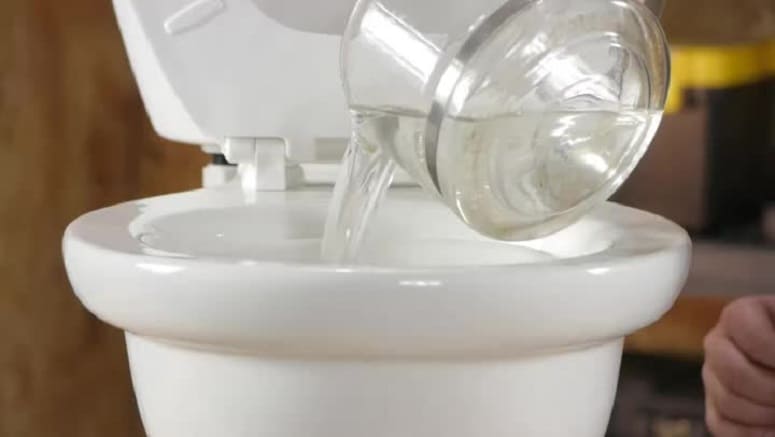
What happens when you discover a blockage in the middle of a road trip?
Some of you may be dealing with this situation right now.
Ordering products and tools to clear a clog can be difficult when you are far from home, and finding a local professional to help you may be difficult, not to mention expensive.
Don’t worry, you won’t have to turn your RV around and go home. You can try the following method to break the obstruction down using readily available items.
Warning: Do not give this a try if your toilet is already near-to-overflowing. The same goes for if your tank sensors are telling you the tank is full and it won’t dump. You don’t want to deal with backflow too.
For this method, all you’ll need is boiling water — and plenty of it. Firstly, boil several gallons of water. Then, pour the hot water down your toilet and let it sit there for a few hours.
If you have an arctic package on your RV or fifth wheel, make use of it. Switch the black tank heaters on for extra warmth.
Ideally, any existing clogs should be softened by the heat.
Preventing Future Clogs
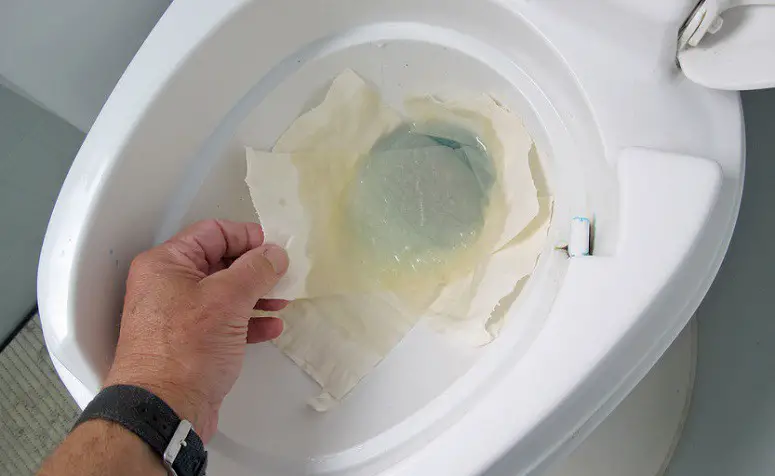
Keeping blockages from forming in your black tank is a relatively easy task.
Regular maintenance accompanied with a little common sense goes a long way.
Watch What You Flush
Remember how I mentioned some things should never be flushed down RV toilets?
Take that seriously. No sanitary items, wipes, or paper towels should go down your toilet.
This applies to heavy toilet paper too. You can buy special types of septic-safe toilet paper designed with motorhome toilets in mind. These are able to break down faster than other brands.
The faster the toilet paper breaks down, the less likely it is to block up your black tank.
Learn How Often To Dump Your Tank
As I mentioned above, you shouldn’t be dumping your black tank too infrequently or too often.
Let your tank become at least two-thirds full before you dump it via portable tanks.
Don’t forget that drying your tank out can cause obstructions. Make sure there is some liquid (water and a maintenance product) in your tank at all times.
Regular Maintenance
Use maintenance products on your tank as often as possible.
The cleaner you keep your tank and waste pipe, the better.
Remember to keep your sensors clean too, so they provide you with accurate readings. Staying on top of your black tank maintenance routine will also reduce unpleasant smells.
Good Habits To Practice For Your Blackwater Tank
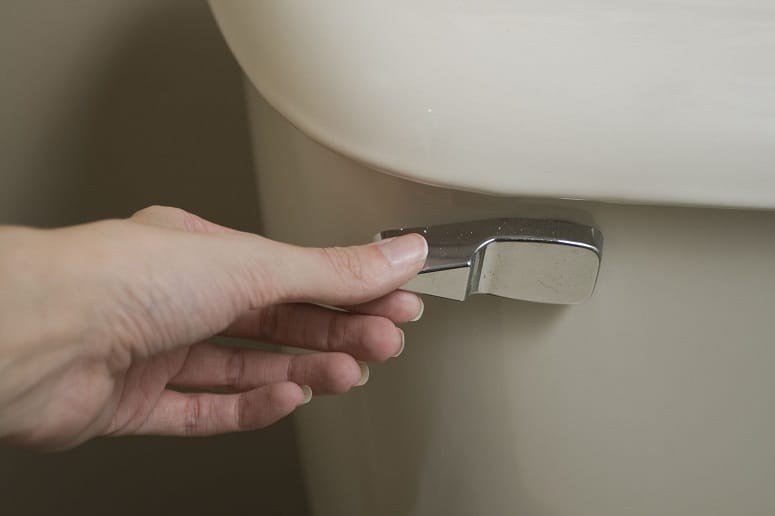
There are numerous good practices you should follow when using the toilet in your RV.
These will help you lower the risk of waste accumulation.
Double-Flush
If there’s solid waste in your toilet, be sure to flush at least twice. This is to ensure everything passes cleanly through the waste pipe.
Educate All Travelers
If you’re traveling with children or anyone new to the RV lifestyle, educate them. Explain that these toilets are more fragile than the toilets at home.
Emphasize that nothing but toilet paper should go into the toilet. You don’t want to find out mid-trip that your black tank is clogged because of a careless passenger.
Use Products Specific For RV Or Campers
An unclogging product you use at home might damage your pipes or black tank. RV sewage systems are not made of the same materials as residential ones.
To be on the safe side, only use products that are specifically made for RVs.
Conclusion
I hope you found this step-by-step guide helpful. Dealing with a clogged black tank is a frustrating experience for any RV owner.
Taking good care of your black tank will reduce the chances of obstructions, as will practicing good habits when it comes to using the toilet in your RV.
Do you have any other tips or techniques for unclogging an RV black tank?
Please share your knowledge with us in the comments below. If this article helped you, feel free to share it with your friends, family, or anyone else who loves RVing.


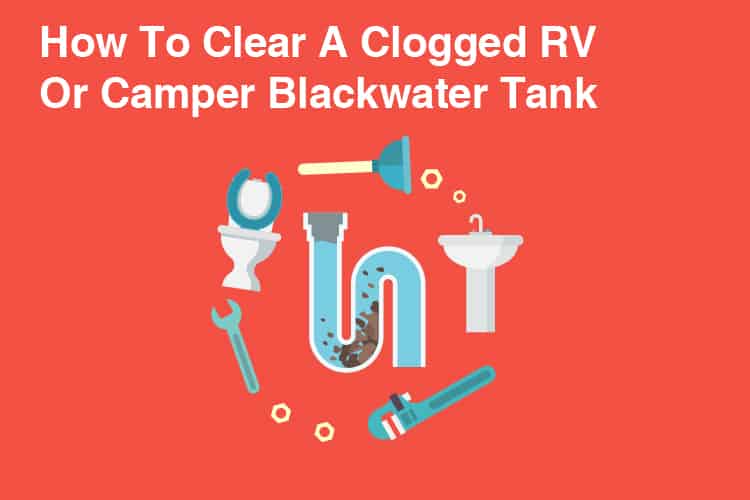
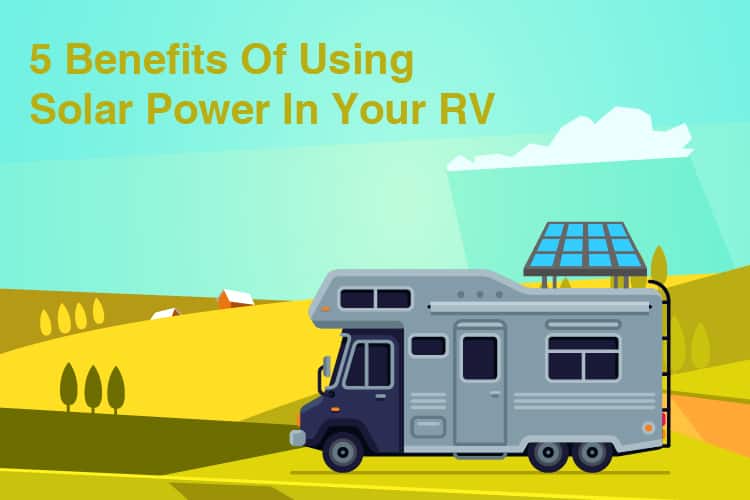
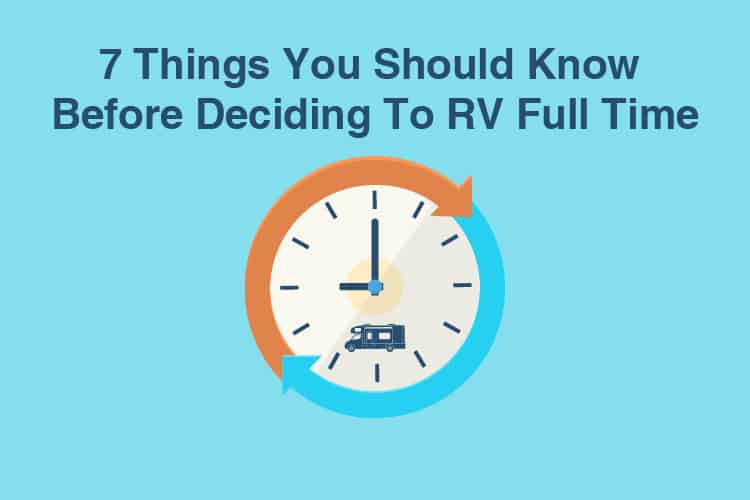

I found on my black water tank that the valve wasn’t fully opening. So each time I was dumping the tank, it was never emptying. My sensor was also showing my tank was still full. Not the best job to do, but I ended up replacing the valve. Once I pulled the pipe off, everything dumped out. EVERYTHING!!! Once the new valve was installed I flushed the tank out to remove anything left inside. Which also allowed me to test the valve out multiple times.
Thanks for the article!!
Bob Krimmer
I will try to use your way to solve my RV`s problems. Thank your useful post, I will read more about your new posts.
The handle to open and close the black water to dump it will not close. As soon as i let go of the handle it opens up. I have tried to clean it inside the toilet. Ran the water from the garden hose thru till it was clear. I had the handle replaced but it was doing the same thing again. It wont close so when you cap it. Black water fills the drain when you take the top off to empty the leakage runs out.
The slider to stop and release the waste under the rv is stuck close and the knob broke off now the toilet won’t drain and is filled to the rim, how can I fix that slide?
I have another question that How to Prevent your RV Toilet Tank from Getting Clogged. Can you help me to answer it? Thanks so much!!
How do you clean the sensors on your black tank. I suspect this is what needs to happen.
Are gray water tank has been full for days now and we can’t seem to get in blocked. We moved to a different spot some of it broke lose but not all of it. I font know what else to try. I need your help and what else is the safest stuff to put down are toliet. We dont get paid until the first. We don’t put anything down it but toilet paper. Can I try baking soda and hot water with vinegar down are kitchen sink and run hot water to see if that helps are problem?